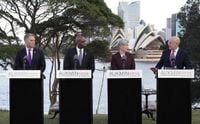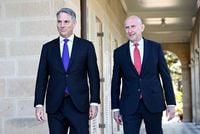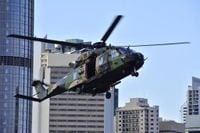On Saturday, July 26, 2025, Australia and the United Kingdom signed a landmark 50-year defense treaty in Geelong, Victoria, cementing a historic partnership to build nuclear-powered submarines. This treaty, hailed as the most significant bilateral agreement between the two nations since Australia's federation in 1901, represents a major step in deepening defense ties amid rising geopolitical tensions in the Indo-Pacific region.
The agreement, known as the Geelong Treaty or the Nuclear-Powered Submarine Partnership and Collaboration Treaty, was signed by Australia's Deputy Prime Minister and Minister for Defence, Richard Marles, and the United Kingdom's Secretary of State for Defence, John Healey. The signing took place during the UK-Australia Defence Ministers' Meeting, which also included Australian Foreign Minister Penny Wong and UK Foreign Secretary David Lammy.
At a press conference in Sydney the day before the signing, Marles described the treaty as "as significant a treaty as has been signed between our two countries since federation," emphasizing its profound importance. The treaty underpins bilateral cooperation for the design, construction, operation, sustainment, and eventual disposal of the SSN-AUKUS submarines, a new class of conventionally armed, nuclear-powered attack submarines.
The Geelong Treaty builds upon the trilateral AUKUS security partnership, established in 2021 between Australia, the UK, and the United States to counter China's growing military influence in the Asia-Pacific. While the treaty itself is bilateral, both Australia and the UK stressed that it does not alter the trilateral nature of AUKUS but rather strengthens the UK's and Australia's role within it.
Under AUKUS, the United States is initially set to provide Australia with a fleet of Virginia-class nuclear submarines, with the first vessels expected to arrive in the early 2030s. Subsequently, the UK and Australia will jointly develop and build the SSN-AUKUS submarines, with the first expected to be operational by the early 2040s. The program is expected to involve a workforce of over 21,000 people in the UK at its peak and create thousands of high-skilled, well-paid jobs across both countries.
The treaty also provides a framework for developing the necessary personnel, infrastructure, regulatory systems, and supply chains to support Australia's submarine program. It supports port visits and the rotational presence of a UK Astute-class submarine at HMAS Stirling under the Submarine Rotational Force - West, enhancing interoperability and operational readiness.
Importantly, the Geelong Treaty complies with international nuclear non-proliferation obligations, including the Treaty on the Non-Proliferation of Nuclear Weapons, the South Pacific Nuclear Free Zone Treaty, Australia's safeguards agreements with the International Atomic Energy Agency, and the trilateral AUKUS Naval Nuclear Propulsion Agreement (ANNPA). This ensures that the program maintains strict adherence to global nuclear security standards.
The deal is expected to generate up to £20 billion (approximately $27 billion) in UK exports over the next 25 years, boosting defense industries and supply chains. Australian Strategic Policy Institute senior analyst Euan Graham noted that the treaty reflects the vital role of the UK-Australia partnership within the AUKUS framework and will produce economies of scale that could allow the UK's Royal Navy to expand its nuclear submarine fleet from seven to twelve vessels.
Despite this progress, the AUKUS pact is currently under review by the administration of U.S. President Donald Trump, who took office in January 2025. U.S. Defense Secretary Pete Hegseth is assessing the alliance to ensure it aligns with the "America First" policy and that allies contribute more to collective security. Concerns have been raised about potential delays in delivering the first Virginia-class submarines to Australia, as U.S. submarine production is reportedly behind schedule.
Both Marles and Healey welcomed the U.S. review as an opportunity for the new administration to reaffirm its commitment to AUKUS. Healey stated, "Australia and the UK welcome the review because we see this as a chance for a new administration to renew their commitment to AUKUS. And that's what we expect." When asked about the possibility of Britain and Australia proceeding independently if the U.S. withdrew, both ministers declined to speculate, with Healey adding, "Any sort of hypotheticals that you suggest simply aren't part of the picture."
Australia has already committed significant funding to the program, having paid the U.S. two installments of $500 million each this year. The total cost of the submarine program is expected to reach up to $245 billion, reflecting the scale and ambition of the project.
The treaty signing coincided with Exercise Talisman Sabre 2025, the largest military exercise ever conducted in Australia. Over 35,000 military personnel from 19 nations are participating, including 3,000 British troops. On Sunday, July 27, 2025, Marles and Healey visited the northern city of Darwin to inspect the British aircraft carrier HMS Prince of Wales, which is taking part in the war games. UK Foreign Secretary David Lammy emphasized the symbolic importance of the carrier's presence, saying, "With our carrier strike group docking in Darwin, I think we're sending a clear signal, a signal of the UK's commitment to this region of the world. Our determination to keep the Indo-Pacific free and open, and that we stand together."
The Geelong Treaty marks a new chapter in UK-Australia defense relations, promising decades of collaboration and shared security objectives. It not only strengthens the military capabilities of both nations but also underscores their commitment to regional stability amid a shifting global landscape.



